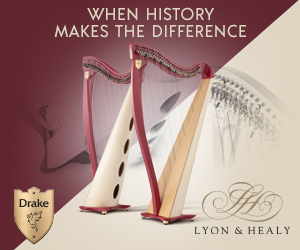Home › Forums › Performing › Breaking stereotypes in the living room: m/f ?
- This topic has 3 replies, 4 voices, and was last updated 11 years, 5 months ago by
aglaia-t.
-
AuthorPosts
-
November 26, 2012 at 8:02 am #62421
Loonatik
MemberIn addition to a once-upon-a-time thread about harps being masculine/feminine
http://www.harpcolumn.com/forums/young-harpists/posts/57542I have also encountered stereotypes, that harps are “soft and soothing” sounding and played with a gliss motion or sound tinkly.
So, I was thinking, if you would have someone coming in your living room with such a stereotype, and you actually bother to correct their perception but willing to engage in any (technical) discussions how a harp can sound or can be played, you could play ONE small piece to relay the message/argument.
In this case, stereotype #1: many feel/think a harp is feminine.
What piece (just one) would you recommend to play that brings our the harps masculinity?
Any less advanced piece would you recommend? what about advanced pieces?In terms of techniques, i guess some are associated/perceived as being feminine, e.g. gliss, harmonics… but what else could be associated as being masculine? e.g quick LH jumps with chords?
Share your ideas.
November 26, 2012 at 1:58 pm #62422Angela Biggs
MemberIn the earliest days with my harp, I read something about the early days of pianos that mentioned pianists used to play like harpists (refering to rolled chords), but then there was a movement toward giving the piano its own sound by playing block chords, which are “more masculine”. I wish I could cite the source, but this is all I remember of what I read. I can say that as I’ve gotten better and have been able to place my fingers fast enough to play larger chords in blocks, instead of cracking them, I’ve noticed that the block chords sound much more masculine.
I’m hearing a piece in my head, but I don’t know which one it is. I’ll think about it and try to pull the name to the front of my mind. Anything I’ve played would fall into the “less advanced” category. If you’re looking for slightly more advanced, Deborah Henson-Conant’s “New Blues” is not feminine at *all*, and it’s super-fun and quite bouncy.
As far as harps being soft: frankly, they are, especially when you compare them to almost any other instrument. You can play a concert grand loudly and get a big sound, but it still won’t stand up to much other instrumentation. I don’t think that’s a drawback, though.
November 27, 2012 at 6:01 pm #62423tony-morosco
ParticipantAlthough Angela is right, a harp is not a loud instrument by comparison, the same is also true of guitar. That’s why the electric guitar was invented. As a way to get the guitar to be heard over a big band, and later over a loud rock band. As electric harps become more common I think there is a big potential for them to be able to be used in more genres and settings (check out Deborah Henson-Conant’s blog on her touring with rock legend Steve Vai as part of his band for a perfect example).
As for a piece to challenge stereotypes I would go with Stairway To Heaven for several reasons.
One is that almost everyone gets asked, often as a joke, if they can play Stairway, so actually doing it is a pleasant surprise.
It is a classic rock anthem that many people instantly recognize, is quintessential ROCK, yet sounds great on harp.
The different sections of the piece vary in ways that really allow you to show the different sides of the harp. The beginning section is a very pretty melody that allows the harp to show off the more classic and expected nature of the harp. There is the middle section that builds tension and allows you to use the harp for dramatic effect, and the ending is just an all out rocking conclusion that lets you show the side of the harp that often doesn’t get recognized, using louder dynamic, block chords, rock rhythms.
It really suits the harp well and shows what it can really do all while presenting it with a piece of music that is so recognized that almost everyone but the most anti rock snob will enjoy.
November 30, 2012 at 11:26 am #62424aglaia-t
ParticipantI played some Bernard Andres music – Duke, Absidioles, those felt pretty masculine to me. A lot of Latin harp music are quite neutral in terms of masculinity/femininity. Maybe playing a song with some percussive effects will make the harp seem less quiet.
-
AuthorPosts
- You must be logged in to reply to this topic.






